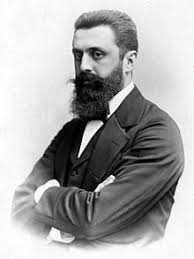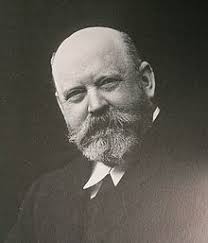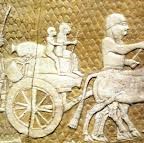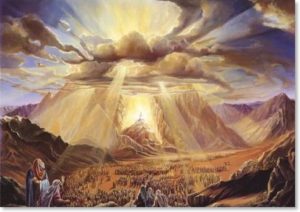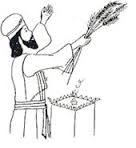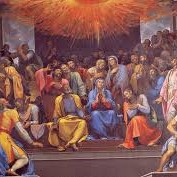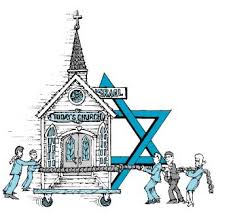STAR 16--A Discussion with Carmen Welker (Part 1) Shalom Saints! Check out Carmen's Webites and Associated Ministry: The Refiner's Fire Reality Check TV The Aramaic English New Testament
Messianics—Modern Day Levites—Separated for Service to God—Thoughts and Reflections on Torah Portion Behaalosecha
Messianics—Modern Day Levites—Separated for Service to God—Thoughts and Reflections on Torah Portion Behaalosecha
Some in our Faith Community liken Messianics to the Levitical Priests and Levite workers of old. And I personally think there’s some merit to that comparison.
We know that the Levites, who were under Aharon and Sons’ direct oversight, were held to higher standards of living than the rest of the nation (see my post entitled living a life beyond the norm). In fact, Father separated the Levites from the other 12-Hebrew tribes. The Levites as a tribe would be wholly beholden to Him and the service of the Tabernacle. In exchange for their complete service, Yah would be the Levites’ inheritance. For YHVH said unto Aharon:
“Thou shalt have no inheritance in their land, neither shalt thou have any part among them: I AM THY PART AND THINE INHERITANCE AMONG THE CHILDREN OF ISRAEL” (Num. 18:20; KJV).
This set-up/construct was a partial establishing and foreshadowing of the promise that Israel would be a royal, priestly nation:
“And ye shall be to me a royal priesthood and a holy nation” (Exo. 19:6; LXX; cf. Exo. 23:22).
By extension, of course, this passage points to modern day Messianics role in being a light to the nations. The job of Messianics is an extension of the Levites’ original job: that of pointing and guiding the nation-peoples of this world to the Creator of the Universe. Today we are in part a fulfillment of that royal priesthood declaration that Abba Father has set in place for His chosen people.
This week’s Torah Portion entitled “Behaalosecha—When You Set Up“—is found in Numbers 8:1-12:16.
Although this reading touched upon a great many events and issues, for today’s discussion, I want to focus our attention on the dedication and service of the Levites as recorded in Numbers 8:5-26.
Within this fascinating section of Torah, we get a sense of what Father requires of those who have sworn to commit the rest of their lives to serving Him and the Body of Messiah. And what we will find in thday’s discussion is that many of the elements that separated the Levites for service in the Tabernacle were in great part a foreshadowing of the elements that Yeshua and His apostles taught would be necessary for our service to the Kingdom of God.
So let’s unpack this Torah Portion and see what we can see.
__________________________________________________________________________________________
There are two themes that are intricately linked to the story of the Levites dedication. The first theme has to do with the Levites being brought to a place of “Ritual Purity” so that they may serve in the Tabernacle. And the second theme is that of the Levites actually walking in their calling. In other words, the walking in their calling involed the Levites being officially and ceremonially separated from the other tribes of the nation and wholly dedicated to service in the Tabernacle.
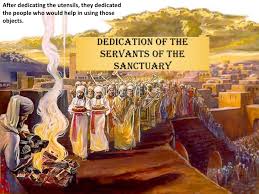
The dedication of the Levites, as depicted in this week’s Torah Portion, foreshadows the spiritual purity and dedication for service that every modern-day Messianic is called to possess.
Ritual Purity
Ritual purity was a non-negotiable requirement for Levites to serve in the Tabernacle. Failure to be in a state of ritual purity would result in the Levite becoming separated from YHVH (ie., cut off from Yah’s presence) and being denied the opportunity to serve (Lev. 22:3).
As it related to our reading this week, those being dedicated for service in the Tabernacle were the Levites. These were not the Levitical Priests. Instead, these Levites would support the Levitical Priests in their work in the Tabernacle. These could be considered as the work-horses of the Tabernacle. For these physically fascilitated the Tabernacle operation. Their priestly brothers, on the other hand, were holy and served various intermediary-functions between YHVH and the people.
Andn like their Aharonic-priestly brothers, the Levites were expected to always be in a state of ritual purity.
Ritual Purity Defined
In preparation for service, Moshe was instructed by YHVH to see to it that the Levites were ritually clean. The Hebrew term for “clean” that is used here is “taher” or “tahor.” “Tahor” as used in our Torah reading this week denotes a “ceremonial preparation for sacred duty” (Brown, Driver, Briggs Hebrew-English Lexicon).
Scriptural Incidents Where Ritual Purity Came Into Play
We find throughout Torah specific incidents where Abba instructed the Hebrews to conduct ritualistic cleansings in order for individuals and objects to be acceptable unto YHVH:
- Purification of the booty taken in war (Num. 31:23).
- Women were to undergo postpartum cleansing (Lev. 22:4-7).
- Men who suffered discharges were to undergo cleansing (Lev. 25:13).
- Those healed of leprosy were to undergo cleansing (Lev. 14).
- Any who were exposed to dead bodies were required to undergo ritualistic cleansing (Num. 19).
- Soldiers killed in warfare were required to undergo cleansing (Eze. 39:12-16).
As it related to their dedication to service in the Tabernacle, Father instructed that the Levites adhere to the following symbolic cleansing ritual:
1. These were sprinkled (spattered) with purifying water (vs. 7).
Ezekiel prophesies of a time in the future—maybe in the Messianic Age—when He will sprinkle clean water upon physical Israel, which will symbolically purge the nation of their uncleannesses and their idols. This act by YHVH will once and for all cleanse the nation for service unto YHVH (Eze. 36:25; LXX).
The writer of Hebrews speaks of the blood of Yeshua replacing such ceremonial rites as the sprinkling of water on those who would serve in the Tabernacle (Heb. 9:10). It is Mashiyach’s (ie., Messiah’s) perfect blood through Yah’s Ruach (ie., His Spirit) that permanently purifies our souls from works that lead to death. Thus, it is Master’s blood that purifies us for serve to the Kingdom of God (Heb. 9:14; CJB).
Indeed, the purification rites that the Levites underwent before YHVH at the Tabernacle foreshadowed the purification we would enjoy through the work and agency of Y’shua haMashiyach.
2. These were to shave their bodies (vs. 7).
The idea of every Levite completely shaving his body in preparation for this ceremony, according to Abraham ibn Ezra (ie., an 11th/12th century Spanish Jewish commentator and philosopher), served to symbolize “the most perfect purity, and a removal of all superfluity of haughtiness and excrescence (wild outgrowth of something) of the flesh from them” (Gill’s Bible Commentary).
Levi Ben Gersom Gersonides (ie., a 13th/14th century French Talmudist) looks at the shaving question from the standpoint of a message that is directed to the Levite preparing to serve in the Tabernacle: that “he must forsake material things and employ themselves in the service of God” (Gill’s Bible Commentary).
I personally recall some 36-years ago, my first day of military training in Pensacola, Florida, having my head shaved along with 2-dozen or so fellow naval officer candidates. The process of having our heads shaved according to our Marine Corp Drill Instructor, was to strip us of our identities; our uniqueness; our individuality. In so doing, we as a class of trainees would be equal in every sense, having no individual agendas with the exception of one: obediently serving and accomplishing those tasks given to us by the U.S. Navy as one single body.
And as we saw mentioned in Hebrews 9, the blood of Y’shua cleanses us from all impurity and readies us for service. Needless to say, there is no need for the disciple of Messiah, though he or she is in a sense could be considered a modern day Levite (or for that matter, even a priest of YHVH), with Y’shua as our High Priest, to undergo such a rite as shaving one’s body in preparation for service.
3. The Levites washed their garments and their bodies (vs. 7).
The washing of the clothes and of their bodies seemed to go hand-in-hand .
Recall that when the people arrived at the base of Mount Sinai and agreed to meet with YHVH, Father instructed that the people wash their clothes in anticipation of the meeting (Exo. 19:10). I believe the people washed their bodies as well.
The spiritual application to be drawn from this story are enormous. When meeting with and serving Father—in whatever capacity that may be—He requires that we be in a state of purity: that we be clean or “tahor.” Otherwise, we are no good to Father.
Churchianity would have us ascribe to the mindset that our purity is imputed unto us by the blood of Y’shua haMashiyach. And to a great extent this is true. However, it is incumbent upon each of us to ensure that there is no lingering, chronic, invited, habitual impurity within us. We must have skin in the “purity game so to speak” and deny sin to continue in our lives. Then we must allow the Holy Spirit to purify (ie., cleanse us) from the inside out.
4. Israel Lays Hands Upon the Levites
The laying on of hands is a practice to (1) confer a blessing, or (2) impart something from one person to another person or from a person to a creature or thing.
To begin with, when we look at laying on of hands, there must be some form of identification with the object or person upon which the hands are laid.
According to the author of an article I found in wikibooks on this subject:
“The hands become a channel through which something from the Ruach haKodesh is transferred from one to the other” (https://en.wikibooks.org/wiki/hebrew-roots/the_origninal_foundation/laying_hands_hebraic).
One Hebrew variation of laying on of hands is “Samak,” which implies the act of laying one’s hand on someone or something so as to lean heavily upon that person or thing. It conveys the idea of “forcibly pressing down upon, so that the victim was viewed as a support. This conveyed the idea of the pressure or weight of responsibility which was to be borne by the victim as a result of the laying on of hands.” Thus, an obligation of some sort was placed upon the one the hands were placed.
The Hebrew word for hand is “yadh,” which denotes “strength, authority and power.” Thus the laying on of hands implies the hand-layer drawing from a place of “great strength and authority;” the reservoir of authority and strength coming from YHVH, being conferred upon the recipient.
The 5-Functions related to laying on of hands:
1. Impartation—Whereby an unction of the Ruach haKodesh is passed from the Spirit-filled anointed servant of YHVH onto the recipient. In this sense, the laying on of hands results in the impartation of spiritual blessings, giftings, power and authority onto the recipient.
2. Identification—Generally in terms of a sacrifice, whereby the offerer identifies him/herself with the sacrifice through physical contact (ie., laying on of hands). The act of laying on of hands in this sense makes the offerer one with the offering. In so doing, the offering bears the sins of the offerer (Lev. 1:4; 3:2; 4:15, 24, 29, 33; 16:21,22; Num. 8:12).
3. Confirmation—Dual application as it relates to the laying on of hands: (1) Witnesses laying their hands upon an accused would be making a formal confirmation attesting to the guilt of the accused (Deu. 17:2-7). (2) An overseer or leader of an assembly confirms a member’s giftings and ministry, the purpose of which is to edify the Body and Assembly of Messiah (Act. 14:22; 15:3; 1 Tim. 4:14,15; 1:18; 2 Tim. 1:6, 14).
4. Ministration of Blessings—The act of transferring blessings from YHVH to the recipient. In this example, however, the hands of the anointed servant is not placed upon the individual, but instead, over or toward them. In so doing, there was a sense that the recipient’s situation would improve (eg., Gen. 48:13-20). This is famously illustrated in the Aharonic or Priestly Blessing (Num. 6:23-27; cf. Lev. 9:22).
5. Commissioning for Ministry—This is generally done in the ordination of ministry and commissioning and sending of workers forth to minister. This served as a public acknowledgment that the receiver of the commissioning was (1) ordained; (2) commissioned through established human authority; and (3) equipped to perform the ministerial task(s) that was set before him/her (Act. 6:1-7; 13:3; 1 Tim. 4:14; 2 Tim. 1:6)
The Purpose of the Laying on of Hands in this Story
Matthew Henry comments that by placing their hands upon the Levites, the Hebrews “transfered their interest in them and in their service to God and to His sanctuary.” Thus, in this sense, the people were not imparting YHVH’s Spirit upon these men. Instead, the people were publicly acknowledging or proclaiming unto YHVH and to the world, symbolically speaking, that the Levites would serve in lieu of them having to do the work of the Tabernacle.
This symbolic gesture also served as a public acknowledgment that the Levites would be separated from the other tribes of the nation to serve the nation and Yah in the Tabernacle. As a rresult these would no longer be part of the nation’s militia or defense force.
YHVH Works Through the Actions of People
Yah most often works through the actions people. Some contend, for example, that Yah being a Spirit that possesses no actual arms or hands, it is the priests’ hands that become Yah’s hands performing God’s necessary work. Thus, the intent of laying on of hands is that God reaches out through the vessel of His chosen ones’ hands to perform His work. Yah’s presence is in a sense invoked and if accepted of Yah, He visits the proceedings and performs the necessary work.
In this case, the people as opposed to the priests laid their hand upon the Levites. Thus it became the people who invited Yah to show-up and do a great work on their behalf.
According to Lawrence A. Hoffman (co-founder of Synagogue 3000 and professor of liturgy, worship and ritual at Hebrew Union College-Jewish Institute of Religion):
“God visits the earth through the magic of human touch, as sacred a thing as there is.”
Hoffman continues:
“But like all things holy also, nothing bestows the certainty of hope and comfort better than the human touch, properly applied, by those we love: a friend at our bedside, their hand on our own; a soft embrace when words cannot assuage our pain…When explanations only make things worse, when words ring hollow, when we just have nothing to say, we can reach out, God-like, feeling hope’s promise flow to those in need. God shows up best in the warming touch where two hands meet.”
5. Aharon Waves the Levites Before YHVH
In the spirit and likeness of a wave sheaf offering, Aharon “presents” (CEB; DBY; DRA; ERV; ESV; JPS; KJV; NAB; NAU; NIV), “offers” (ASV; CJB; HCSB; NET), “separates” (LXX) the Levites “for a gift before YHVH from the children of Israel” (8:11; LXX). Aharon’s actions insinuated:
“Father, here are the Levites, which the nation is offering/presenting/separating out from the peoples of Israel, to serve You, the Tabernacle and the priests.”
6. Meat, grain and sin offerings were offered unto YHVH (vs. 8, 12).
As required with every opportunity the Almighty affords His people to worship, burnt, sin and grain offerings were made on behalf of the newly dedicated Levites.
We find in verse 12 that Abba instructs that the Levites lay their hands upon the heads of the 2-bullocks (LXX has it as calves). One bullock would serve as a sin offering and the other for a burnt offering unto YHVH.
The purpose of laying one’s hands on an animal sacrifice was symbolic in nature. Thus, the sins and impurities of the one offering the animal sacrifice were symbolically transfered onto the animal through this simple act of faith.
In reality, nothing was actually transferred onto the animal? Instead, this act of faith certified the state of the offerers heart unto YHVH.
Laying Hands–Sacrifices–Act of Faith
It was YHVH through Jeremiah’s pen that stated:
“I YHVH search the mind, I try the heart, even to give every man according to his ways, according to the fruit of his doings” (Jer. 17:10; ASV)
And given that our God is a God that judges the heart, He credits the sacrifice of the offerer (in this case the Levite) as atonement for his/her sins when he in faith places his hands upon the head of the sacrifice, looking to YHVH that his sins be atoned for.
Obadiah ben Jacob Sforno (15th/16th century Italian rabbinic bible commentator) suggested that:
“Hand-laying is as central to Temple sacrifices of old as it is to my college’s ordination today. And for the same reason; not that rabbis and cantors are sacrifices, God forbid, but because the touch of human hands is how God’s presence may appear.”
An Brief Overview of Offerings/Sacrifices
Burnt Offerings (Hebrew=”karbanot) served as a gift brought to YHVH so that the offerer may be accepted by YHVH (Lev. 1:3). Upon the offerer laying his/her hand upon the head of the burnt-offering, it served as an atonement for the offerer (Lev. 1:4) .
Karbanot is derived from the Hebrew root Qof-Resh-Bet, which means “to draw near,” suggesting that the underlying purpose of rendering offerings unto YHVH is to draw near to YHVH. (Reference: https://www.jewishvirtuallibrary.org/sacrifices-and-offerings-karbanot).
One of the biggest symbolic concepts embedded in karbanot is that of substitution. The concept of substitution as it relates to the karbon is that the offering is a substitute for the offerer. That which ultimately happens to the offering is the thing that should happen to the offerer. One can fairly assert then that the offering is being punished on behalf or in the place of the offerer. In a thematic sense, it is this substitutionary element that is embedded in karbanot that underscores the grace and mercy of YHVH.
Another less obvious concept to be understood from karbanot is that of coming near or drawing close to Yah. Apart from the substitutionary element embedded in karbanot, in getting past the need for dealing with the sins and impurities of the offerer, the sacrifice opens up for the offerer the opportunity to draw or come close to the Almighty.
___________________________________________________________________________________
Before going any further on this subject, it should be noted that all sacrifices ceased with the destruction of the Temple in 70 C.E. The greatest (and most biblical) reason sacrifices were not continued beyond the destruction of the temple is that Torah explicitly required all animal sacrifices be performed at the temple proper by a Levitical Priest.
As disciples of Yeshua haMashiyach, we know that Father did away with all animal and meal sacrifices upon Messiah’s ultimate sacrifice on the execution stake. Any resumption of animal sacrifices on the part of God’s elect would serve absolutely no purpose other than needlessly slaughtering animals. For Yahoshua Messiah’s sacrifice addressed the sin issue once and for all:
“For in that He (Yeshua) died, He died unto sin once…” (Rom. 6:10; KJV).
“Who needeth not daily, as those high priests, to offer up sacrifice, first for his own sins, and then for the people’s: for this He did once, when He offered up Himself” (Heb. 7:27; KJV).
_______________________________________________________________________________
The Five Types of Offerings/Sacrifices
1. The Burnt Offering (Heb. Olah). Olah has the same root as the world “aliyah, which is used to describe a pilgrimage or even a relocation to the Land of Israel. Additionally, it represents an ascension to a synagogue podium to read the Torah scroll or say a blessing during Sabbath worship services.
The whole of the Olah was to be burnt. No part of it was to be eaten, either by the priests, Levites or the offerer.
The Olah represents total, and complete submission to YHVH and His will. Thus, the whole of the offering is rendered unto YHVH. In presenting unto YHVH the burnt offering, the offerer shows forth his/her sincere desire to draw close to YHVH.
Indeed, there is an atoning element attached to the burnt offering/Olah. This should make total sense since the offerer’s sin would have to be dealt with in order for him/her to draw close to or commune with the Almighty.
Burnt offerings could be made from cattle, sheep, goats, or birds.
2. Peace Offering (Heb. Zevach Sh’lamim). This is generally a thanksgiving offering. If one pays close attention to the Hebrew title for this offering, one may see a variation of “shalom” embedded in the Sh’lamim. Shalom, of course, means peace.
Most of the peace offering was to be burnt up on the altar. However, a portion of it was to be given to the priests (ie., the Cohenim) and was to be eaten by the offerer and his/her family.
3. Sin Offering (Heb. Chatat). This offering is meant purely for atonement and purging of unintentional sins. The offerer comes to the altar in a state of sorrow because of his/her sin and desires to be restored or reconciled to YHVH.
The Hebrew term “chatat,” by the way, means to “miss the mark.”
There were individual as well as communal (ie., community) sin offerings.
Generally speaking (with a few rare occasions), individual sin offerings were consumed by the Cohenim and Levites.
4. Guilt Offering (Heb. Asham). This was a unique sin offering that addressed sins whereby the offerer believed he or she committed a sin but they weren’t certain as to what sin they actually committed. The guilt offering was also used to address the breaching of trust (ie., inadvertently not fulfilling one’s word or responsibility to someone).
The Asham was consumed by the Cohenim and Levites.
5. Food and Drink Offerings (ie., Meal Offerings). This was a devotional offering representing the fruit of one’s personal labor. Submitting a meal offering required exacting preparations on the part of the offerer. For it represented the offerer’s personal heartfelt gift to YHVH.
A representative portion of the meal offering was consumed on the altar. The rest however, was consumed by the Cohenim and Levites.
Levites Officially Set Apart For Service of the Tabernacle
Returning back to our story, we receive in verse 17 an explanation as to why Father was separating the Levites from the whole of the community of Israel for service in the Tabernacle.
Father told us back in Exodus 13:2-15 that the firstborn of the Hebrews were to be holy (special; separated) unto Him. Now, in this dedicatory service, Father is saying that the Levites were holy and special unto Him. So what gives?
According to Torah, the firstborn of every Hebrew family would forever remain special to YHVH. However, the Levites were special unto YHVH in that from this point forward (ie., from that dedicatory service forward), their entire existence would be focused on YHVH and serving Him. The firstborn of the nation were not required to attend to the work of YHVH and the Tabernacle. But now, the Levites would attend to the work and service of YHVH.
It should be noted that the firstborn of the nation could own property and have lucrative businesses and the like. The Levites entire sustenance and wellbeing, on the other hand, came from YHVH.
And thus, after being purified and completing the dedication service, the Levites went to work as full-time servants of YHVH; working out of the Tabernacle. They were overseen by Aharon and Aharon’s sons. Consequently, we are spiritually better-off as a result of their example. For as I stated at the outset of this post, their story contains tremendous spiritual significance for us today.
_________________________________________________________________________________________
Behaalosecha—Instruction in Righteousness and a Shadow of Service to the Kingdom Today
Whenever I engage in study of Torah I keep at the forefront of my mind the purpose for which I am studying it.
I always ask the Father to reveal to me what it is He wants me to learn from the reading. And I believe that if we are open to the teaching of Father’s Ruach, He will open our eyes to see; our minds to understand; and our souls to embrace that which He intends to reveal to us. All that is left for us to do is to take action on the things Father has taught us.
In Behaalosecha, we learn of the historic dedicatory ceremony that inducted the Levites into a lifetime of service in the Tabernacle.
So, the question to be answered in this case is: So what? Why should I care about what happened to the Levites on that historic day back some 3,500 or so years ago on some dusty plain in a middle east wilderness?
And in answering this crucial question, I always go back to two-key passages of the New Testament that helps put the Torah passage in quiestion into its proper perspective.
“For the Torah has in it a shadow of the good things to come…” (Heb. 10:1a; CJB).
And:
“All Scripture (ie., Torah—the Prophets—and the Writings) is God-breathed and is valuable for teaching the truth, convicting of sin, correcting faults and training in right living, thus anyone who belongs to God may be fully equipped for every good work” (2 Tim. 3:16,17; CJB).
So, when I look at Behaalosecha from the framework of Hebrews 10:1 and 2 Timothy 3:16,17, I quickly get a sense of what Father expects of me as a modern-day Levite. Not a Levite by birth mind you. But a Levite, spiritually speaking, who is dedicated wholly to the service of the Kingdom of God.
Messianics Set Apart For Service
The dedication of the Levites for service in the Tabernacle highlights for us a number of essential concepts that we must put into practice when we give ourselves over to service for the Kingdom of Yah.
1. Spiritual Purity
Behaalosecha gives us a beautiful glimpse into what was required of the Levites in order for them to be of service in the Tabernacle from a ritualistically pure standpoint. But when we talk about being pure as Messianics today, that purity is spiritual in nature.
Sure, being physically pure from the standpoint of being well-groomed, physically clean at all times and in good health are important to our goal of service in the Kingdom of Yah.
But when we transition over to the spiritual, as disciples of Messiah, our search for purity must transcend the physical. We must always keep at the forefront of our thoughts that which Master told the Samaritan woman at Jacob’s Well:
“But the hour cometh, and now is, when the true worshipers shall worship the Father in spirit and truth, for the Father seeketh such to worship Him” (Joh. 4:23; KJV).
So what then does it mean for one to be “spiritually pure” or “clean?”
It’s An Inside Job
Well, with the outside being taken care of—that is, our bodies and person being in a state of cleanliness—work must also be done on our insides. In working on our insides, we’re going to require some serious help. Unfortunately, we are incapable of cleaning up our insides on our own. Thus, Master gave us a helper so that we may, in concert with the Holy Spirit’s work, be able to effectively have our insides cleaned.
But in order for the Holy Spirit to begin its work purifying our inner man/inner woman, we’re going to have to allow the Holy Spirit to do its work. Otherwise, if we stand in the Spirit’s way (eg., allow sin to continue in our lives; disobey Father’s commandments; hold on to old carnal and spiritual baggage, etc.), the Spirit’s work will be stymied (ie., impeded) and we’ll remain the old, impure soul we were before we came to Faith.
So from a buy-in standpoint, each of us has a role to play in the clean-up and purification (ie., sanctification process) of our inner man/woman.
It’s Time For a Heart Transplant
Ground-zero for inward purity of course is our hearts. Our hearts have to be right before we can be of true service to the Kingdom. Thus, it behooves us to seek after a heart transplant. For the Psalmist wrote:
Psm. 51:10—”Create in me a clean heart, O God; and renew a right spirit within me” (KJV).
If our hearts aren’t right, there is no hope of being at one with the Father, nor of being permitted to serve in the Kingdom.
It was Master Yeshua who extolled the virtues of having a pure heart to the people who came to hear His Sermon on the Mount:
Blessed are the pure in heart: for they shall see God. (Mat 5:8 KJV)
The Psalmist famously highlighted the state of one’s heart as a requirement for one to truly ascend to the presence of YHVH:
Psm. 24:3-5—”Who shall ascend into the hill of YHVH? Or who shall stand in His holy place? He that hath clean hands, and a pure heart; who hath not lifted up his soul unto vanity, nor sworn deceitfully. He shall receive the blessing from YHVH, and righteousness from the God of his salvation” (KJV)
Therefore, the process of having our hearts purified for service requires that we do the following:
“Lay aside all malice, and all guile, and hypocrisies and envies, and all evil speakings…and desire the sincere milk of the Word that we may grow…” (1 Pet. 2:1; KJV).
The Pharisees and Scribes as Examples of Impurity
If anything, it is the example of the Pharisees and Scribes of the first-century C.E./A.D. that put this whole concept of spiritual purity into perspective for us. These religious leaders were looked upon by the Jewish population of their time as being beyond reproach as it related to their being ritually pure, holy and righteous. But Master called them out on their missing the mark in that respect:
Mat. 23:25-28—”Woe to you, scribes and Pharisees, hypocrites! You clean the outside of the cup and dish, but inside they are full of greed and self-indulgence! Blind Pharisee! First clean the inside of the cup so the outside of it may also become clean. Woe to you scribes and Pharisees, hypocrites! You are like whitewashed tombs, which appear beautiful on the outside, but inside are full of dead men’s bones and every impurity. In the same way, on the outside you seem righteous to people, but inside you are full of hypocrisy and lawlessness” (HCSB).
Thus, as Messianics today, we must endeavor to come into a state of spiritual purity if we are serious about serving the Kingdom of Yah.
2. Deal With Sin in our Lives
Un-addressed sin in a Messianic’s life will disqualify him/her for active service to the Kingdom. The reason un-addressed sin disqualifies us for service in the Kingdom should be obvious.
We have been called to be servants unto YHVH. When we fail or refuse to deal with ongoing sin and disobedience in our lives, we become servants to sin as Yeshua taught:
“Verily, verily, I say unto you, whosoever committeth sin is the servant of sin.” (Joh. 8:34; KJV).
Master expounded upon this principle of dual service (ie., serving sin and Yah) when He taught the “Parable of the Dishonest Manager.” Master taught:
“No servant can serve two masters: for either he will hate the one, and love the other; or else he will hold to the one, and despise the other…” (Luk. 16:13; KJV).
The Apostle Paul also expounded upon this issue when he wrote to the Messianic Assembly in Rome:
“Don’t you know that if you offer yourselves to someone as obedient slaves, you are slaves of that one you obey—either of sin leading to death or of obedience leading to righteousness” (Rom. 6:16; HCSB).
Obedience is an Important Element of Sanctification
Spiritual purity requires that we not only repent and stop sinning, but that we also obey Yah’s eternal Word of Truth.
The Apostle Peter wrote:
1 Pet. 1:22—(Peter calling the brethren to Holy living)—”By obedience to the truth, having purified yourselves for sincere love of the brothers, love one another earnestly from a pure heart, since you have been born again—not of perishable seed but of imperishable—through the living and enduring word of God” (HCSB).
So in order for us to be of service as modern day Levites, we’re going to have to repent from ongoing sin in our lives; stop sinning; and then earnestly obey YHVH’s and Y’shua’s instructions.
3. Offer Ourselves to the Service of the Kingdom and Draw Close to YHVH
Behaalosecha records that Aharon, the High Priest, waved the Levites before YHVH, offering them unto YHVH for service in the Tabernacle.
Now, did Aharon physically wave them up and down before YHVH? No. He simply presented them to YHVH in a dedicatory manner and YHVH accepted their service accordingly.
In like manner, spiritually speaking, we must present ourselves unto YHVH for service.
Paul wrote that the Messianics of the Roman Assembly do that very thing. He wrote:
“I beseech you therefore, brethren, by the mercies of God, that ye present your bodies a living sacrifice, holy, acceptable unto God, which is your reasonable service” (Rom. 12:1; KJV).
In so offering ourselves up to Yah for service in the Kingdom, we must draw close to Him.
Drawing Close to YHVH to Serve
The writer of the Book of Hebrews penned the following:
Heb. 10:22—”let us draw near with a true heart in full assurance of faith, our hearts sprinkled clean from an evil conscience and our bodies washed in pure water” (HCSB).
According to the NET Bible commentary on this passage:
“The OT imagery of the sprinkling with blood to give ritual purity with the emphasis on the interior cleansing provided by the new covenant: it is the heart that is cleansed and the conscience made perfect.”
We’re talking about a heart that is submissive to YHVH. It is the atoning work of Y’shua that activates the provisions of the renewed covenant within us, whereby one’s inner person undergoes a process of purification (ie., sanctification). Father’s Ruach haKodesh does a progressive work within the converted disciple of Mashiyach that causes him/her to begin serving the Kingdom with a purified heart.
Baptism is what is likely meant by the pure water. So it is important that every Messianic be baptized at some point in their journey.
James wrote:
Jam. 4:8—”Draw near to God, and He will draw near to you. Cleanse your hands, sinners, and purify your hearts, double-minded people” (HCSB)!
Thus, when we offer ourselves unto YHVH and we draw close to Him, He will use us to His glory and ultimate purpose.
4. Walk in Service that is Beyond that of the Original Levites
And once we’ve been purified and dedicated to the service of the Kingdom, we then need to walk in that calling and service. And we must do so with joy and reverence and purity of heart, mind and soul.
Paul wrote about this to the Messianics of the Ephesian Assembly:
“I therefore, the prisoner of the Lord, beseech you that ye walk worthy of the vocation wherewith ye are called, with all lowliness and meekness, with longsuffering, forbearing one another in love; endeavouring to keep the unity of the Spirit in the bond of peace” (Eph. 4:1; KJV).
And unto the Thessalonian Messianics on this same theme Paul wrote:
“…walk worthy of God, who hath called you unto His kingdom and glory” (1 The. 2:12; KJV).
In All, We Must Strive to do Better Than the Levites
Although the Levites, as depicted in our Torah Reading today, are in a sense a pattern for us to emulate (in reality we’re to emulate our Master Yeshua) in our quest to serve YHVH, we’re actually called to do better than the Levites.
It was Master who made this real to us when He told the following story:
25 And, behold, a certain lawyer stood up, and tempted him, saying, Master, what shall I do to inherit eternal life?
26 He said unto him, What is written in the law? how readest thou?
27 And he answering said, Thou shalt love the Lord thy God with all thy heart, and with all thy soul, and with all thy strength, and with all thy mind; and thy neighbour as thyself.
28 And he said unto him, Thou hast answered right: this do, and thou shalt live.
29 But he, willing to justify himself, said unto Jesus, And who is my neighbour?
30 And Jesus answering said, A certain man went down from Jerusalem to Jericho, and fell among thieves, which stripped him of his raiment, and wounded him, and departed, leaving him half dead.
31 And by chance there came down a certain priest (Levitical) that way: and when he saw him, he passed by on the other side.
32 And likewise a Levite, when he was at the place, came and looked on him, and passed by on the other side.
33 But a certain Samaritan, as he journeyed, came where he was: and when he saw him, he had compassion on him,
34 And went to him, and bound up his wounds, pouring in oil and wine, and set him on his own beast, and brought him to an inn, and took care of him.
35 And on the morrow when he departed, he took out two pence, and gave them to the host, and said unto him, Take care of him; and whatsoever thou spendest more, when I come again, I will repay thee.
36 Which now of these three, thinkest thou, was neighbour unto him that fell among the thieves?
37 And he said, He that shewed mercy on him. Then said Jesus unto him, Go, and do thou likewise.
(Luk 10:25-37 KJV)
And thus, it was Master who gives us the best end to this discussion for today: Let us go and do likewise.
STAR 16–A Discussion with Carmen Welker Part 1
STAR 15–Understanding the Bible Part 3–A Question of Inspiration or Perspiration
Understanding the Bible Part 3—A Question of Inspiration or Perspiration What is the Bible? As it relates to the Bible, how many of you have heard the Bible described and labeled as the Holy Bible? What about the bible as the “unadulterated Word of God?” How bout...
STAR 12–Understanding the Bible Part 2 (Why Should Believers Read Their Bibles)
Understanding the Bible Part 2--Why Should Believers Read the Bible? Opening Scripture Passage: Hos 4:1-6 KJV The Moedim Conference--United in Torah--May 1-3, 2015 in San Diego, CA. Featured Guests: Psalmstress Elisha Rico Cortes--Founder Wisdom in Torah Ministries...
Torah Living 50–Understanding the Bible (Is the Church Suffering from Biblical Illiteracy?)
Introduction What is the bible? Some would contend the bible to be the “unadulterated Word of God.” Others would similarly contend that the bible is NOT the word of God per se, but rather it contains the Word of God. Others would say that it is an instruction manual...
STAR 11–Understanding the Bible or Is the Church Suffering from Biblical Illiteracy?
Understanding the Bible Part 1--Is the Church Suffering from Biblical Illiteracy? What is the bible? Some would contend the bible to be the “unadulterated Word of God.” Others would similarly contend that the bible is NOT the word of God per se, but rather it contains...
Sabbath Thoughts & Reflections 10–The Day of Firstfruits or the Wave Sheaf Offering
9 ¶ Then the LORD spoke to Moses, saying, 10 "Speak to the sons of Israel, and say to them, 'When you enter the land which I am going to give to you and areap its harvest, then you shall bring in the sheaf of the first fruits of your harvest to the priest....
Torah Living 49–The Day of Firstfruits or the Wave Sheaf Offering
Yom Bikkurim or the Day of Firstfruits This Feast of Firstfruits in Hebrew is referred to as Yom HaBikkurim (meaning the Day of the First ripe fruits of a crop) or the Day of the Wave Sheaf. On this day, the cohen (aka priests) would wave a sheaf of the first fruits...
Mentally Preparing for Passover
6 aYour boasting is not good. bDo you not know that ca little leaven leavens the whole lump of dough?7 Clean out the old leaven, that you may be a new lump, just as you are in fact unleavened. For Christ our aPassover also has been sacrificed.8 Let us therefore...
STAR 8–Preparing for Passover Mentally, Physically and Spiritually
Preparing for Passover Mentally, Physically and Spiritually Preparation is a key factor in getting the fullest possible spiritual, cognitive and physical benefit from the Feasts. Failure to adequately prepare in every aspect of our being could lead to a less-than...
Because you are Obedient Part 3–Forgetting Yehovah
Picking up in Chapter 8, verse 11, we find that we are commanded not to forget Yehovah our Elohim. The passage reads: 11"Beware lest you aforget the LORD your God by not keeping His commandments and His ordinances and His statutes which I am commanding you today;...

